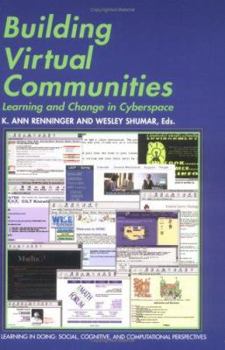Building Virtual Communities: Learning and Change in Cyberspace
(Part of the Learning in Doing: Social, Cognitive and Computational Perspectives Series)
Building Virtual Communities examines how learning and cognitive change are fostered by online communities. Contributors to this volume explore this question by drawing on their different theoretical backgrounds, methodologies, and personal experience with virtual communities. Each chapter discusses the different meanings of the terms community, learning, and change. Case studies are included for further clarification. Together, these chapters describe the building out of virtual communities in terms that are relevant to theorists, researchers, and practitioners. The chapters provide a basis for thinking about the dynamics of Internet community building. This includes consideration of the role of the self or individual as a participant in virtual community, and the design and refinement of technology as the conduit for extending and enhancing the possibilities of community building in cyberspace. Building Virtual Communities will interest educators, psychologists, sociologists, and researchers in human-computer interaction.
Format:Paperback
Language:English
ISBN:0521785588
ISBN13:9780521785587
Release Date:July 2002
Publisher:Cambridge University Press
Length:416 Pages
Weight:1.30 lbs.
Dimensions:0.9" x 6.3" x 9.0"
Customer Reviews
1 rating
Interesting but to my mind very uneven
Published by Thriftbooks.com User , 22 years ago
I found this to be a mildly interesting collection of papers but rather uneven in focus and range. Several papers tried to reach theoretical heights while others contented themselves by reporting on specific projects, e.g. Math Forum. The volume is quite 'a house divided' but there are cross currents.The biggest problem with the book is that it has something for everyone. Hence each chapter has some points of interest but nothing of great insight or profundity is elaborated. For instance the theorising on communities is to my mind absolutely primitive. No mention of Hobbes or Locke here. The whole question of the political dynamic of a community is simply not addressed, i.e. power structures. This is serious flaw.The book tends to reflect technocratic stance on community building. At all costs avoid value judgements and the moral dimension. Communities by numbers. In fact, the communities described in various papers seem to really be fan clubs or hobby clubs which are using the internet to further their purposes. No big deal in many ways. Of course from the authors perspective that would be too simple a reading of the actual value of 'virtual comunities'. The danger is that some readers may simply perceive many of the efforts to elaborate on the digital components of a 'community' as mere psuedo-intellectual twaddle. For example no one speaks of a 'telephonic community' emerging post Alexander Bell. People were more grounded in those days it seems. There is much emphasis on Computer Mediated Communication (CMC) throughout the book as a significant leap into a new state of togetherness. Much of this is hard to argue with if it was merely stating the obvious, i.e. kids talking about games in chat rooms, parents discussing their kids math progress, etc. However, one can't but feel that the thrust of the book in towards overkill. The internet is in many of these instances is simply a souped up penpal system.It is easy to be critical of a book like this and see it akin to any other book telling us how much sand is in the Sahara. However, the authors clearly believe that the internet can inspire a new communal modality.I am not sure I would share their enthusiasm having run several lists and online 'club's over the years. What strikes me as glaringly absent, is an analysis of how one motivates users to remain within a group and contribute. How do you motivate people? Crack that and the world will change. A recent issue of the Communications of the ACM published interesting research from Microsoft showing just how hard it is to get people to come forward socially on the net.I wouldn't recommend passing over this book. It is worth skimming out of interest just to keep yourself abreast of emergent themes but I would put in the second rank and in preference first buy a good elearning book (by Alessi for instance).






